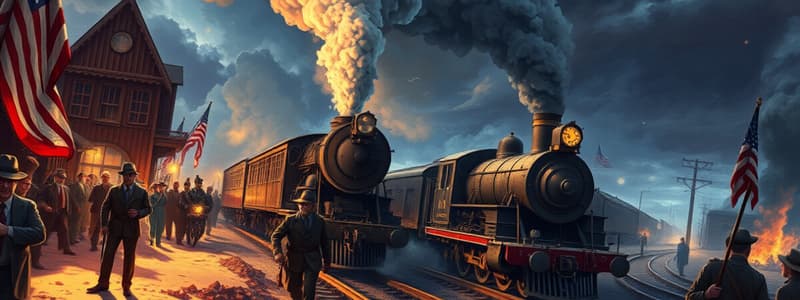Podcast
Questions and Answers
What was the significance of the Great Railroad Strike of 1877?
What was the significance of the Great Railroad Strike of 1877?
The Pullman railroad workers went on strike because their wages were cut twice in one year, while the cost of town housing and general store goods remained the same. The Supreme Court denied the leader's wish to be released from jail, thus helping big business.
When did the Great Railroad Strike start?
When did the Great Railroad Strike start?
1877
How many people died in the Great Railroad Strike?
How many people died in the Great Railroad Strike?
About 100 people were killed.
Railroad employees can strike under any circumstances.
Railroad employees can strike under any circumstances.
What was the effect of the Great Railroad Strike of 1877?
What was the effect of the Great Railroad Strike of 1877?
What was the end result of the Great Railroad Strike of 1877?
What was the end result of the Great Railroad Strike of 1877?
Why did the railroad strike of 1877 come to an end?
Why did the railroad strike of 1877 come to an end?
How did the government react to the Great Railroad Strike of 1877?
How did the government react to the Great Railroad Strike of 1877?
What was the first nationwide strike in the United States?
What was the first nationwide strike in the United States?
Who hired the Pinkertons to break up a strike?
Who hired the Pinkertons to break up a strike?
How did the Homestead strike end?
How did the Homestead strike end?
Who started the railroad?
Who started the railroad?
What is the significance of the Railway Labor Act?
What is the significance of the Railway Labor Act?
What was the main reason the United States government intervened in the Great Railroad Strike of 1877?
What was the main reason the United States government intervened in the Great Railroad Strike of 1877?
Flashcards are hidden until you start studying
Study Notes
Great Railroad Strike of 1877
- Significant labor movement where Pullman railroad workers protested wage cuts amid unchanged living costs.
- The strike began in 1877 and involved over 100,000 workers, halting more than half of the nation's freight transport.
- Roughly 1,000 arrests occurred, with around 100 fatalities reported during the strike's duration.
Government Intervention
- Railway Labor Act prevents strikes until certain procedures are followed, often delaying labor actions.
- The federal government intervened, deploying troops for the first time to handle a labor dispute during the Great Railroad Strike.
- Intervention was fueled by public sentiment supporting railroad companies facing disruption.
Effects and Outcomes
- Strikes spurred across different states, causing significant disruptions to commerce in Eastern and Midwestern regions.
- The violence and vandalism during the strikes led to a hasty governmental response, primarily ending the strike by August 1877.
- The Great Railroad Strike exemplified the tensions between labor rights and business interests in the U.S.
Historical Context
- Marked the first nationwide strike in U.S. history, triggered by economic hardship and wage reductions during the 1870s depression.
- The federal response set a precedent for future government actions concerning labor disputes, indicating a trend favoring business interests over workers' rights.
Legacy
- The Railway Labor Act of 1926 emerged from earlier conflicts, ensuring workers the right to organize and bargain collectively in the railroad industry, highlighting its economic significance.
- The Great Railroad Strike paved the way for future labor movements, illustrating the need for labor reforms and protections.
Studying That Suits You
Use AI to generate personalized quizzes and flashcards to suit your learning preferences.





